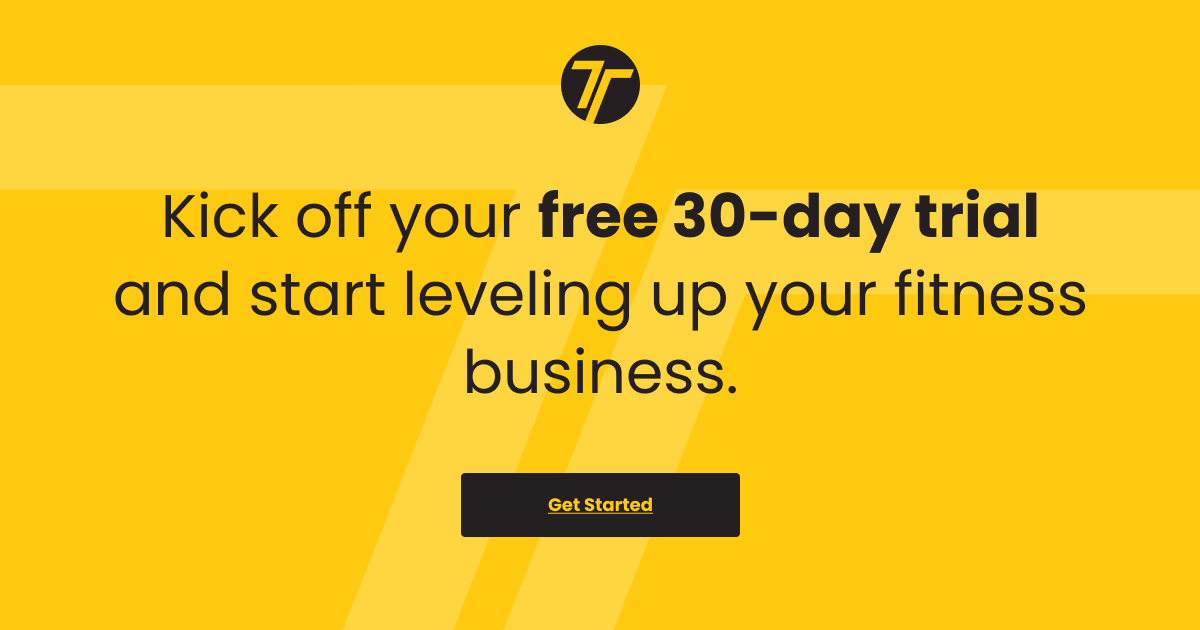
In today’s economy, you can’t build a career on pure passion; you need to pull the right levers to turn that passion into a solution people will pay for.
If you’re someone who loves nutrition science and helping others live healthier lives, you already have a skill set in high demand. People are realizing that while exercise matters, it’s often nutrition that drives the most significant changes. In fact, what we eat day in and day out can have a much greater impact than the small percentage training alone might account for.
This has made nutrition coaching one of the fastest-growing career paths in fitness and wellness. Whether you’re a trainer, a certified nutritionist, or just someone ready to carve out your own space in the industry, the opportunity is here.
The key is knowing how to pair your expertise with business strategy and use the right tools to deliver your services at scale.
Step #1: Get the Right Foundation (Education & Certifications)
Passion is essential, but credentials are what make clients trust you.
A recognized certification, such as Precision Nutrition, NASM Nutrition Coach, ISSA, or ACE, gives you the baseline credibility to charge for your expertise.
From there, you can specialize further based on your audience —whether that’s athletes, busy professionals, or corporate wellness.
Think of certifications as your license to operate. They protect you, legitimize your services, and signal that you take this work seriously.
Pair that with ongoing education, and you’ll stay relevant in a field that evolves quickly.
From there, you’ll need to go deeper.
- Specialize and study closely: Don’t try to be everything to everyone. Pick an area you care about and master it. That might be a dietary approach (high-protein, plant-based, sports nutrition, gut health), a client type (athletes, busy professionals, corporate groups), or program design itself (what to include, what to avoid, how to keep it sustainable).
- Look at what’s working: Pay attention to coaches who are successful right now. What problems are they solving? How do they package their services? What results are their clients getting? Don’t copy them, but learn from the models that clearly work.
- Learn the business side. Coaching is one part of the job. To turn it into a career, you also need to understand operations, offers, sales, and marketing. These skills build on each other, and the earlier you start, the faster you’ll be able to grow beyond just trading time for money.
Fast-Track Your Success as an Online Trainer: Check Out ABC Trainerize Academy Courses
Think of this step as your foundation: the education that legitimizes you, the specialization that sets you apart, and the business know-how that ensures you can actually make a living from it.
📝 Free Resource: Nutrition Coaching Cheat Sheet for Personal Trainers
Step #2: Define Your Niche & Ideal Clients
Nobody really coaches “the general public”—that doesn’t exist. Every client has specific problems, and the more precisely you define and solve them, the stronger your business becomes.
Think about the issues people are trying to address through nutrition right now: gut health, weight management, athletic performance, plant-based eating, hormonal balance, and meal planning for a busy lifestyle.
The demand has exploded because more people than ever see food as the key to improving every part of their health. The more specialized you get, the easier it is to:
- Speak directly to a client’s struggles
- Design programs that feel custom
- Position yourself as the go-to expert in that space
This is what separates a coach who dabbles from a coach who builds a career. Specific problems create specific markets, and specialization is what allows you to own one of them.
Start by looking at where your knowledge and interest overlap with demand. Do you want to work with athletes chasing performance, professionals who need quick and realistic meal plans, parents trying to balance family nutrition, or people moving toward plant-based eating?
Each group has different challenges, and being the coach who speaks directly to them is what gets you noticed.
Then, test your niche against reality. What are people actually paying for? Which problems have proven demand? This isn’t about chasing temporarily hyped trends, more so about aligning your expertise with solutions people are willing to invest in.
Finally, tie it back to business. Your niche should guide how you design your programs, price your services, and market yourself. When you know who you’re helping and what specifically, it becomes easier to build the right offers that attract the right clients.
📝 Check Out: The 5 Key Elements of Good Nutrition Coaching
Step #3: Package Your Expertise into Services
Expertise only becomes a career when you know how to package it. Knowledge on its own doesn’t sell; people buy clarity, structure, and outcomes.
That means you need clear offers clients can understand at a glance. A few proven ways to package nutrition coaching include:
- 1:1 Coaching: Personalized meal planning, habit support, and accountability
- Group Programs: A structured plan delivered to many clients at once (lower cost for them, more scale for you)
- Add-ons to Training: If you’re a fitness coach, for example, pair nutrition with workout programming for a complete solution
- Habit Coaching Programs: Focus on behavior change instead of just meal plans
- Tiered Packages: Different levels of support (basic check-ins vs. full coaching) so clients can choose the level of investment that suits them
Here’s the key: don’t offer “nutrition advice” as a vague add-on. Package your services so they solve a problem and fit into a business model. That’s what makes it easier to sell, deliver, and scale.
ABC Trainerize Introduces: Nutrition Center: Your New Hub for Client Nutrition Insights
Step #4: Build a Digital Presence
If you want to make a career out of nutrition, people need to find you, and that won’t happen by accident. Your digital presence is your storefront, your reputation, and your client pipeline all in one.
A professional website is one option, but it’s not the only way. Look at marketplaces and directories where people actively search for nutrition help, as well as online groups and communities where your ideal clients already spend time.
Meeting clients where they are is often faster than trying to pull them in cold.
At the same time, build a presence across the channels that fit your niche, such as Instagram, TikTok, YouTube, or even newsletters.
Share content that proves your expertise: practical nutrition tips, recipes, client results, or educational posts that show you know your field.
You don’t need to do everything at once. Test different platforms, see what sticks, and double down on the ones that bring real traction.
Consistency matters more than reach. Over time, this approach both attracts new clients and builds the trust they need to pay for your services.
📝 Read More: Virtual Nutrition Coaching | How to Take Your Business Online
Step #5: Use ABC Trainerize to Systemize and Scale Your Nutrition Coaching
With coaching, you primarily sell knowledge. But knowledge on its own doesn’t scale; you end up repeating the same explanations, plans, and check-ins for every client.
Software is what turns that knowledge into a system you can deliver consistently, measure, and improve. Without it, you’re stuck at the limit of your own time.
ABC Trainerize for Nutrition Coaches Gives You That System:
- Smart Meal Planner: Create meal plans once, adapt them for many clients, and update them instantly.
- Habit Coaching: Assign daily actions and track completion automatically, so behavior change isn’t left to chance.
- Photo Food Logs & Progress Tracking: See what clients actually do, measure outcomes, and make adjustments with data, not guesswork.
- Messaging & Reminders: Keep accountability and communication inside one platform instead of juggling emails and apps.
- Integrations: Combine nutrition with workouts, wearables, and other tools to deliver a complete, unified program.
This isn’t about tech for tech’s sake. It’s about taking what you already know, packaging it in a way that’s consistent and repeatable, and freeing up your time to grow your business instead of re-creating the wheel.
📝 Check Out: Introducing ABC Trainerize Business: A Smarter Way to Scale Your Coaching Business
Step #6: Master Client Experience and Accountability
The best nutrition plan is worthless if clients don’t understand it, can’t stick to it, or don’t see the value in paying for it.
What sets successful coaches apart is how they communicate that knowledge, deliver it consistently, and make clients feel supported.
It’s a daily hustle to:
- Break complex advice into simple habits clients can follow daily
- Check in regularly so clients know they’re not on their own
- Track progress visibly so clients see the results and feel their investment is justified
- Celebrate milestones to build motivation and retention
The idea is for your clients and prospects to feel the impact of your coaching, from their grocery shopping to the brand of supplements they choose to the way they approach forming new habits. This way, they stick around longer, refer others, and make your career sustainable.
Step #7: Price and Monetize Strategically
Pricing is one of the most complex parts of building a nutrition coaching business. Set your rates too low and you’ll burn out without ever making a living. Set them too high without proving your value, and clients won’t buy.
The sweet spot is understanding what you’re really selling: not just meal plans, but expertise, structure, and accountability. That’s what makes people pay and stay.
Here are a few proven ways to structure your pricing:
- Monthly packages: predictable revenue and easier budgeting for clients
- Hybrid bundles: pair nutrition with training or habit coaching for a higher-value offer
- Tiered services: for example, a low-touch option with basic check-ins vs. a premium option with full 1:1 support
- Group programs: more affordable for clients but scalable for you
When deciding on your price, look at three things:
- Your costs and time investment: How much do you need to make to sustain your business?
- Market benchmarks: What are other coaches in your niche charging?
- Perceived value: Does the price signal the level of expertise and results you provide?
If you want to go deeper into pricing strategies, resources like Precision Nutrition’s Business Pricing Guide or Nerd Fitness’ Coaching Pricing Insights can help you see how other professionals structure their services.
Step #8: Market and Grow Your Business
Marketing is an essential part of your job when you’re an independent professional or a business. Expertise matters, but visibility is what fills your client list. The sooner you see marketing as a core skill and task, the faster you’ll grow.
Here are three areas to focus on:
- Social Proof: Collect testimonials, client stories, and before-and-after progress to show what’s possible with your coaching. If you’re just starting, consider offering a free assessment or a short trial in exchange for a testimonial. That’s often the easiest way to build credibility early.
- Partnerships: Collaborate with other coaches, local businesses, or even social media creators who share your audience. A small collab, like a joint challenge, cross-promotion, or guest workshop, can expose you to hundreds of potential clients.
- Content and Visibility: Content is how you stay top of mind and showcase your expertise at scale. The key is to meet your clients where they already are on social media or elsewhere. Pick one or two platforms, post consistently, and pay attention to what resonates. Over time, double down on the channels that bring actual leads, not just likes.
📝 Check Out: The Power of Client Referrals and How to Get Them
Step #9: Expand Beyond 1:1
One-on-one coaching is excellent and fulfilling until you reach the cap. To build long-term stability and growth, you’ll eventually need to expand into models that let you serve more people without sacrificing quality.
Here are a few proven ways to do it:
- Group Challenges: Run 30-day clean-eating or habit-based nutrition challenges in ABC Trainerize. You can coach dozens of clients at once, use leaderboards or progress tracking to keep motivation high, and still provide personalized check-ins when needed.
- Online Courses or Programs: Package your expertise into structured lessons or a 6-week program. Deliver it via ABC Trainerize so clients can access daily tasks, meal guides, and accountability tools, all within the app.
- Community Programs: Build an online group around your niche, whether it’s plant-based eating, corporate wellness, or performance nutrition. A sense of community keeps people engaged and reduces drop-off.
- Digital Products: Create meal guides, recipe packs, or ebooks. These are lower-ticket offers that let new clients test your approach before committing to higher-priced coaching. You can sell products with Trainerize as add-ons.
📝 Read More: Conversion Techniques That Work: How to Transform Cold Leads into Loyal Clients
Conclusions
Building a career in nutrition coaching is getting harder.
Free content, AI tools like ChatGPT, and endless meal plans online mean clients have more options than ever. But that’s precisely why there’s still opportunity. You win by stepping in where the tech stops, creating genuine relationships, guiding people through change, and keeping them accountable in ways no free tool can.
That’s where ABC Trainerize ties in. It gives you the system you need:
- A way to package and deliver your nutrition coaching consistently (meal plans, habit coaching, progress tracking)
- A way to build accountability into every client’s day (reminders, check-ins, food logs)
- A way to scale without burning out (templates, automation, integrations)
It becomes easier if you have an audience, a gym, or a community to partner with, or extras you can bundle into your offer. But without a system like Trainerize to run it all, you’ll struggle to turn passion into a business.
If you’re ready to take your nutrition expertise from “side hustle” to career, ABC Trainerize is built for that.

